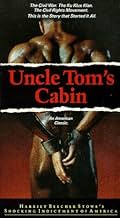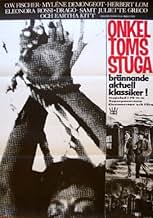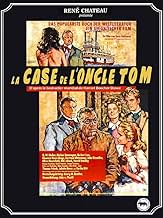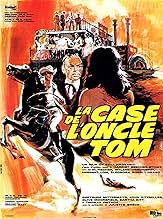In the pre-Civil War South, a sadistic plantation-owner brutalizes his slaves to the point that they have no other choice but to rebel. Always obedient, peaceful, honest old slave Tom plays ... Read allIn the pre-Civil War South, a sadistic plantation-owner brutalizes his slaves to the point that they have no other choice but to rebel. Always obedient, peaceful, honest old slave Tom plays a central role in this tragedy.In the pre-Civil War South, a sadistic plantation-owner brutalizes his slaves to the point that they have no other choice but to rebel. Always obedient, peaceful, honest old slave Tom plays a central role in this tragedy.
- Awards
- 1 win & 1 nomination total
Michaela May
- Evangeline Saint-Clare
- (as Gertraud Mittermayr)
- Director
- Writers
- All cast & crew
- Production, box office & more at IMDbPro
Storyline
Did you know
- TriviaProducer Aldo von Pinelli first announced Louis Armstrong to be playing the part of Uncle Tom, but the failing health of the singer and actor made this impossible. Simon Legree was first offered to Mario Adorf and Gert Fröbe, before Herbert Lom took over the part. Other roles were intended to be played by Harry Belafonte, Ella Fitzgerald and Omar Sharif, but none of them actually participated in this movie.
- GoofsWashington D.C.'s Lincoln Memorial is depicted as being in New York.
- Alternate versionsRe-cut and re-dubbed in 1977 for a re-issue in the U.S. Jeffrey Hunter's voice is not heard in this version, which was used for the videocassette release now available.
- ConnectionsEdited into Uncle Tom's Cabin (1977)
- SoundtracksSaber Dance
Written by Aram Khachaturyan
Featured review
Many years have passed since Geza Radvanyi directed this movie, an adaptation of an abolitionist cult novel by Harriet Beecher Stowe, UNCLE TOM'S CABIN, a very famous literary work that, similarly to other voices of truth in history, cried out for freedom, righteousness and equality in spite of attacks from politically correct people. The many I met as well as some reviewers on this board expressed their strong criticism claiming that the film is more a European uncle Tom interpretation. They also say that there are so many discrepancies between the book and the film that it is absolutely useless to see it. I agree, it is different, it is more ONKEL TOMS HUETTE than UNCLE TOM'S CABIN in its direction style and acting style; but it does not mean that Radvanyi's work is bad as a film.
Let me first analyze the beginning scenes that really captivated me as original and raised my interest in the movie. What we are exposed to is something like "double retrospection." First, we see modern skyscrapers, Statue of Liberty and...the monument of Abraham Lincoln, a man who changed the destiny of many Americans, as the narrator adds. Immediately, the action moves more than 100 years back - April, the 14th, 1865: we see President Lincoln in the famous theater. On that day of his death, he is given the book UNCLE TOM'S CABIN by its author Harriet Beecher Stowe who thanks him for changing America. When things turn bad for Lincoln, we are supplied with the view of the novel's cover. This memorable close-up appears to constitute the answer why such a good man as Lincoln had to be assassinated... Was America still divided? From this moment, the film constitutes the adaptation of the novel. I described this beginning in such a detailed way because I found it exceptionally accurate and memorable. Later, it is true that the action seems to be quite slow, the film is long. Nevertheless, it has, sometimes unnoticed but important advantages that make it a nice film or at least significant to be seen by any film lover.
It is, undeniably, the music. The wonderful Negro songs based on the Biblical texts as well as on their hard experience and thoughts raised in sorrow and suffering moved me to tears. The musical pieces about Moses and the Red Sea or the Missisipi River which was a sort of symbolic reference to the Bible are beautifully executed. The viewer, even if not very knowledgeable of the historical period, has a clear picture of the lifestyle, of dreams those people had, dreams of better times when the black and the white may join hands as free men. Therefore, with this music comes the idea, comes the American dream of liberty. This idea is more a universal subject of American history from abolitionists to Martin Luther King and those who will come after. And that makes the film a must see, no matter how faithful to the novel it is.
It is also some performances that make Radvanyi's film worth a look. Herbert Lom, a German actor born in the Czech Republic, memorably portrays the cruel Simon Legree, a man for whom a slave is less than animal. Similarly to the book, he represents the whole system of the southern plantations where tears, beating, rape and overworking were the daily bread for the black slaves (not 100% plantations were like that for sure, which raised negative reactions towards the book among many southerners and the content was regarded as subjective). A lot of moments with Mr Lom remained in my memory but in particular the unforgettable scene when Legree comes to Shelby's house. The two world views are beautifully contrasted and this behavior of his, obscene and vulgar, is something that Herbert Lom accurately expressed. I also liked the Italian actress Eleonora Rossi Drago and Vilma Degischer, an Austrian who plays Mrs Shelby. They do fine jobs.
Except for those facets, the movie is not that great as some other productions of the time. It's a pity that the colors and the cinematography in this film are seriously dated. Faded colors indicate the older years of cinema when the film was made but it is, I agree, the fact that lowers the value of this production from today's perspective. There were many better movies with magnificent cinematography in the 1960s than this one.
All in all, if you look at this film as only a novel adaptation, you will be confused or even disappointed since each of us who reads the book first has his/her own view, imagination which is usually disturbed by the director's vision. If you look at this film from the perspective of the modern viewer, you will find it dated and not very attractive, perhaps. You should look at it independently, as an optimist viewer, frank one who can find good sides in each piece of art. Then, the movie will be worth seeing.
UNCLE TOM'S CABIN has one thing absolutely in common with the book. It asks, of course nowadays a different generation, the questions that our ancestors were asked by Mrs Stowe: "Is there a right to humiliate someone, deprive him/her of dignity only because he/she was born black?"
Let me first analyze the beginning scenes that really captivated me as original and raised my interest in the movie. What we are exposed to is something like "double retrospection." First, we see modern skyscrapers, Statue of Liberty and...the monument of Abraham Lincoln, a man who changed the destiny of many Americans, as the narrator adds. Immediately, the action moves more than 100 years back - April, the 14th, 1865: we see President Lincoln in the famous theater. On that day of his death, he is given the book UNCLE TOM'S CABIN by its author Harriet Beecher Stowe who thanks him for changing America. When things turn bad for Lincoln, we are supplied with the view of the novel's cover. This memorable close-up appears to constitute the answer why such a good man as Lincoln had to be assassinated... Was America still divided? From this moment, the film constitutes the adaptation of the novel. I described this beginning in such a detailed way because I found it exceptionally accurate and memorable. Later, it is true that the action seems to be quite slow, the film is long. Nevertheless, it has, sometimes unnoticed but important advantages that make it a nice film or at least significant to be seen by any film lover.
It is, undeniably, the music. The wonderful Negro songs based on the Biblical texts as well as on their hard experience and thoughts raised in sorrow and suffering moved me to tears. The musical pieces about Moses and the Red Sea or the Missisipi River which was a sort of symbolic reference to the Bible are beautifully executed. The viewer, even if not very knowledgeable of the historical period, has a clear picture of the lifestyle, of dreams those people had, dreams of better times when the black and the white may join hands as free men. Therefore, with this music comes the idea, comes the American dream of liberty. This idea is more a universal subject of American history from abolitionists to Martin Luther King and those who will come after. And that makes the film a must see, no matter how faithful to the novel it is.
It is also some performances that make Radvanyi's film worth a look. Herbert Lom, a German actor born in the Czech Republic, memorably portrays the cruel Simon Legree, a man for whom a slave is less than animal. Similarly to the book, he represents the whole system of the southern plantations where tears, beating, rape and overworking were the daily bread for the black slaves (not 100% plantations were like that for sure, which raised negative reactions towards the book among many southerners and the content was regarded as subjective). A lot of moments with Mr Lom remained in my memory but in particular the unforgettable scene when Legree comes to Shelby's house. The two world views are beautifully contrasted and this behavior of his, obscene and vulgar, is something that Herbert Lom accurately expressed. I also liked the Italian actress Eleonora Rossi Drago and Vilma Degischer, an Austrian who plays Mrs Shelby. They do fine jobs.
Except for those facets, the movie is not that great as some other productions of the time. It's a pity that the colors and the cinematography in this film are seriously dated. Faded colors indicate the older years of cinema when the film was made but it is, I agree, the fact that lowers the value of this production from today's perspective. There were many better movies with magnificent cinematography in the 1960s than this one.
All in all, if you look at this film as only a novel adaptation, you will be confused or even disappointed since each of us who reads the book first has his/her own view, imagination which is usually disturbed by the director's vision. If you look at this film from the perspective of the modern viewer, you will find it dated and not very attractive, perhaps. You should look at it independently, as an optimist viewer, frank one who can find good sides in each piece of art. Then, the movie will be worth seeing.
UNCLE TOM'S CABIN has one thing absolutely in common with the book. It asks, of course nowadays a different generation, the questions that our ancestors were asked by Mrs Stowe: "Is there a right to humiliate someone, deprive him/her of dignity only because he/she was born black?"
- marcin_kukuczka
- Jun 6, 2007
- Permalink
- How long is Uncle Tom's Cabin?Powered by Alexa
Details
Box office
- Budget
- DEM 4,200,000 (estimated)
- Runtime1 hour 58 minutes
- Sound mix
- Aspect ratio
- 2.20 : 1
Contribute to this page
Suggest an edit or add missing content
































